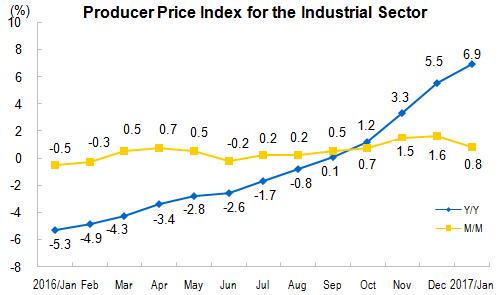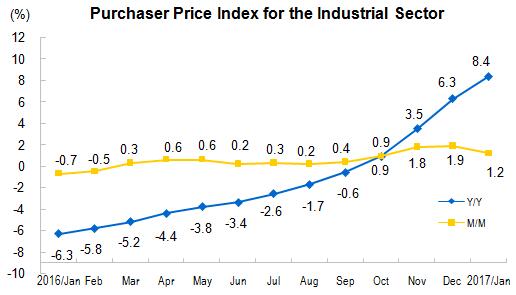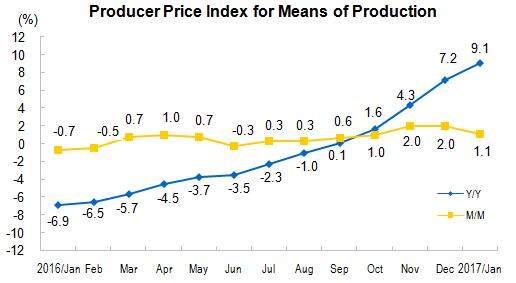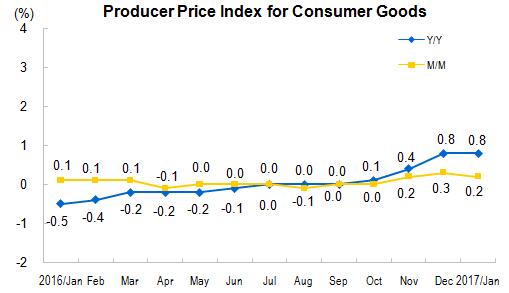Producer Prices for the Industrial Sector for January 2017
In January 2017, Producer Price Index (PPI) for manufactured goods increased 6.9 percent year-on-year, and increased 0.8 percent month-on-month. The purchasing price index for manufactured goods increased 8.4 percent year-on-year, and increased 1.2 percent month-on-month.


1. Year-on-Year Changes of Prices of Different Categories
The year-on-year change of producer prices for means of production increased 9.1 percent, meaning 6.7 percentage points increase in the overall price level. Of which, producer prices for mining and quarrying industry increased 31.0 percent; that of raw materials industry increased 12.9 percent; that of manufacturing and processing industry increased 5.9 percent. Producer prices for consumer goods increased 0.8 percent year-on-year, meaning 0.2 percentage points increase in the overall price level. Of which, producer prices for foodstuff increased 1.3 percent, that of clothing increased 1.1 percent, that of commodities went up by 1.5 percent, and that of durable consumer goods dropped by 0.6 percent.


According to estimation, in the 6.9 percent increases in January, the carryover effect of last year’s prices changing was 6.1 percentage points, while new prices rising factors accounted for 0.8 percentage points.
The year-on-year purchaser price indices for ferrous metal materials increased 18.9 percent, non-ferrous metal materials and wires went up by 15.8 percent, fuel and power increased 14.7 percent, chemical raw materials went up by 8.1 percent.
2. Month-on-Month Changes of Prices of Different Categories
The producer prices for means of production increased 1.1 percent month-on-month, meaning 0.8 percentage points increase in the overall price level. Of the total, producer prices for mining and quarrying industry increased 3.5 percent, that of raw materials industry increased 1.7 percent, that of manufacturing and processing industry increased 0.6 percent. Producer prices for consumer goods increased 0.2 percent month-on-month. Of which, producer prices for foodstuff increased 0.3 percent, that of clothing remained at the same level (the amount of change was 0), that of commodities increased 0.4 percent, that of durable consumer goods increased 0.1 percent.
The month-on-month purchaser price indices for ferrous metal materials increased 2.2 percent, fuel and power went up by 2.1 percent, chemical raw materials went up by 2.0 percent, non-ferrous metal materials and wires went up by 0.4 percent.
| Price Indices for the Industrial Sector in January 2017
| ||
|
| M/M(%) | Y/Y(%) |
|
|
|
|
| I. Producer Price Indices | 0.8 | 6.9 |
| Means of production | 1.1 | 9.1 |
| Mining and quarrying | 3.5 | 31.0 |
| Raw materials | 1.7 | 12.9 |
| Processing | 0.6 | 5.9 |
| Means of subsistence | 0.2 | 0.8 |
| Food | 0.3 | 1.3 |
| Clothing | 0.0 | 1.1 |
| Articles for daily use | 0.4 | 1.5 |
| Durable consumer goods | 0.1 | -0.6 |
|
|
|
|
| II. Purchaser Price Indices | 1.2 | 8.4 |
| Fuel and Power | 2.1 | 14.7 |
| Ferrous Metals | 2.2 | 18.9 |
| Non-ferrous Metal Materials and Wires | 0.4 | 15.8 |
| Chemical Raw Materials | 2.0 | 8.1 |
| Wood and Pulp | 1.0 | 3.3 |
| Building Materials and Non-metallic | 0.7 | 5.2 |
| Other Industrial Raw Materials and Semi-products | 0.5 | 2.4 |
| Agricultural and Sideline Products | 0.5 | 3.0 |
| Textile Raw Materials | 0.6 | 3.3 |
|
|
|
|
| III. Producer Price Indices of Major Industries |
|
|
| Mining and Washing of Coal | 1.7 | 38.4 |
| Extraction of Petroleum and Natural Gas | 10.4 | 58.5 |
| Mining of Ferrous Metal Ores | 2.0 | 23.7 |
| Mining of Non-Ferrous Metal Ores | 1.3 | 17.7 |
| Mining and Processing of Nonmetal Ores | 0.6 | 1.6 |
| Processing of Food from Agricultural Products | 0.4 | 2.6 |
| Manufacture of Foods | 0.2 | 0.8 |
| Manufacture of Wines, Beverage and Refined Tea | 0.1 | -0.5 |
| Manufacture of Cigarettes and Tobacco | 0.0 | 0.0 |
| Manufacture of Textile | 0.5 | 2.6 |
| Manufacture of Textile Wearing Apparel and Ornament | -0.1 | 0.6 |
| Processing of Timbers, Manufacture of Wood, Bamboo, Rattan, Palm, and Straw Products | 0.0 | 0.2 |
| Manufacture of Paper and Paper Products | 1.9 | 5.7 |
| Printing, Reproduction of Recording Media | 0.2 | 0.6 |
| Processing of Petroleum, Coking, Processing of Nucleus Fuel | 3.9 | 24.4 |
| Manufacture of Chemical Raw Material and Chemical Products | 1.8 | 9.2 |
| Manufacture of Medicines | 0.3 | 0.7 |
| Manufacture of Chemical Fibers | 3.0 | 9.3 |
| Manufacture of Rubber and Plastics Products | 0.4 | 1.0 |
| Manufacture of Non-metallic Mineral Products | 0.4 | 4.6 |
| Manufacture and Processing of Ferrous Metals | 2.1 | 37.7 |
| Manufacture and Processing of Non-Ferrous Metals | 0.1 | 17.3 |
| Manufacture of Fabricated Metal Products | 0.7 | 4.3 |
| Manufacture of General- Purpose Machinery | 0.2 | 0.3 |
| Manufacture of Motor Vehicles | 0.0 | -0.6 |
| Manufacture of Railway Locomotives, Building of Ships and Boats, Manufacture of Air and Spacecrafts and Other Transportation Equipments | 0.3 | 0.9 |
| Manufacture of Computer, Communication Equipment and Other Electronic Equipment | 0.1 | -0.1 |
| Production and Supply of Electric Power and Heat Power | 0.1 | -2.0 |
| Production and Distribution of Gas | 2.2 | 0.0 |
| Production and Distribution of Water | 0.3 | 1.9 |
|
|
|
|
Annotations:
1. Explanatory Notes
Producer Price Index for manufactured goods consists of producer price index and purchaser price index.
The industrial producer price index reflects the trend and level of prices change when the products are sold for the first time.
The industrial purchaser price index reflects the trend and level of prices change for the products purchased by the industrial enterprises as intermediate inputs.
2. Statistical Coverage
The statistical survey of industrial producer prices covers prices for over 20,000 products from 1638 subclasses; and the statistical surveys of industrial purchaser prices cover prices for over 10,000 industrial products from over 900 subclasses.
3. Survey Methods
Industrial producer prices are collected from combined surveys of key businesses and typical businesses. The key businesses are those with their annual revenue from principal activities over 20 million yuan, and the typical businesses are those with less than 20 million yuan. The surveys cover about 50,000 industrial enterprises in over 400 cities across the country.
4. Industrial Classification is based on the “Industrial Classification for National Economic Activities” (GB/T4754-2011).
